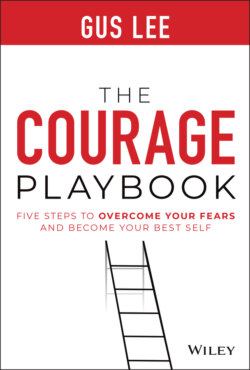Читать книгу The Courage Playbook - Gus Lee - Страница 17
Section I: Personal Information (13 Questions)
Оглавление1 Words that describe the quality of the relationships with your parents & siblingsAs an adolescentYour answer above is a reminder of the power of our pasts. Many find that patterns of relationships in adolescence have an impact on how we now relate to people in general.TodayImproving difficult family relationships shows you can do the same with other people. If stress persists in these situations, you'll find that The Playbook will offer possible solutions.
2 What were the actual living conditions of your home life from earliest memory to age 18? Read across each row in Figure 1.1 and check the one that is closest to your experience.Per Professor J. Garbarino, early childhood trauma returns to haunt us. Do your answers tell you something? Do they form a pattern? What does the pattern tell you? Items C, D, E, G, I, and K can play significant roles on your path to courage. You might want to pay particular attention to these items if you answered them in the Y and Z columns. I had many Z responses and dedicated time to go through therapists until I found an effective, change‐based one.COLUMN XCOLUMN YCOLUMN ZAEconomically stable Economically inconsistent Economically unstableB Emotionally nourishing Emotionally inconsistent Emotionally unsafe/traumaticC Unconditional affection Some affection Little affectionD Very high ethical principles Some ethical principles Whatever worksE Consistent fairness Some fairness Little fairnessF High responsibility Some responsibility Little responsibilityG No depression Some depression Depression was commonH Trained to do the right thing Some training to act rightly Little training to act rightlyI Adults did the right thing Adults struggled to act rightly Adults seldom did the right thingJ Healthy arguing Unhealthy arguing Violent arguingK Physically, emotionally safe Physically, emotionally uneven Physically, emotionally unsafeL Regular meals with family Irregular meals I was on my ownFigure 1.1 Home Life Living Conditions
3 Many of us struggled in adolescence and junior high. Which of your teenage personality traits were the most difficult?Many find that what was a challenge for us as teens can reappear in adulthood. True for you?
4 Read across the rows in Figure 1.2 and circle the one that most closely describes you right now.FEATURE 1orFEATURE 2StressedOften worried, anxiousorUntroubledUnworried, keeps calmPressuredOften harried, hurried, rushedorPlanfulUnhurried, finishes earlyImpatientIrritable, frustrated, crabbyorPatientUnderstanding, forbearingSelf‐servingAmbitious, power‐seekingorSelflessFocuses on others’ needsInner‐focusedIt's my needs, feelings, issuesorOther‐focusedHelps others improveAbruptOften inattentive, thoughtlessorRespectfulAttentive, caringAgitatingComplains, carps, negativeorPeacemakingCalms othersPassiveAvoids controversies, hasslesorAssertiveCommunicates clearlyWorriedFeels weight of fallen worldorConfidentSelf‐assured, positivePerfectionistJudgmental, not good enoughorUnderstandingPerceptive, helpful, patientTiredOften exhausted, worn outorRestedRefreshed, renewedAvoids conflictUsually looks or turns awayorFaces conflictAddresses respectfullyToughOften inflexible, even meanorCompassionateHumane, warm, caringPreferentialFocuses on elites, favoritesorRespects allNo cliques, no favoritismIndependentWants to work soloorTeamingCooperates, helpfulPridefulCocky, self‐centered, arrogantorModestUnpretentious, unassumingDisengagedCan be aloof, isolatedorEngagedRelational, personableDiscouragedOften down, pessimisticorEncouragesSupportive, strengthensAngryQuick‐tempered, volatileorPeacefulHarmonious, tranquilDiscontentedRestlessly malcontentorContentedSatisfied, at equanimityFigure 1.2 Emotional AssessmentYes, you guessed it: you were asked to denote some negative and less flattering behaviors. The Courage Playbook believes that while assets are important, the first step of a journey begins best on the first rung of the ladder so we can see our starting point.In questions 5–13: Disagree or Agree using the following Likert scale.Note: The “cowardly number,” 3, is not an option.12*45strongly disagreedisagree—agreestrongly agree
5 _____ I worry less about life in general than I did two years ago.
6 _____ I sleep more deeply than I did two years ago.
7 _____ I more quickly forgive those who disrespect or hurt me than I did two years ago.
8 _____ I am more physically fit than I was two years ago.
9 _____ I am more content emotionally than I was two years ago.
10 _____ I listen more closely to my spouse/significant other than I did two years ago.
11 _____ I have greater self‐governance than I did two years ago in dealing with others.
12 _____ I have greater self‐governance in eating than I did two years ago (i.e. junk food).
13 _____ I have greater self‐governance than two years ago related to alcohol, drugs, addictions, and screen time.2 Per Mayo Clinic, if you routinely sit, you should get up and move every 30 minutes to forestall heart disease, obesity, and cardiovascular disease.3
The Bio reminded Gary that his father had punished him for getting less than perfect grades, for enjoying sports and expressing an opinion. His father wouldn't listen, frequently criticized his wife and kids, enjoyed hurting Gary and his brothers with sarcasm and disrespect, and refused to improve. Gary has taken on some of his father's worst reactive behaviors regarding people and stress and has become fatalistic about people's ability to change. As frustrations with Dr. Bellevue escalated, his positive coping skills and general health have declined.
